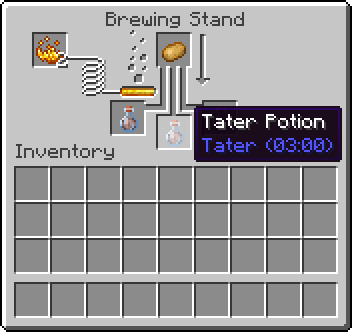🇪🇸 Español (Spanish)
🇪🇸 Español (Spanish)
Appearance
🇪🇸 Español (Spanish)
🇪🇸 Español (Spanish)
Appearance
Las pociones son items consumibles que le dan un efecto a una entidad. Un jugador puede crear una poción usando un Soporte para Pociones u obtenerlas como items a partir de varias mecánicas del juego.
Agregar una poción involucra un patrón similar a añadir un item. Crearás una instancia de tu poción y la registrarás llamando BrewingRecipeRegistry.registerPotionRecipe.
INFO
Cuando Fabric API está presente, BrewingRecipeRegistry.registerPotionRecipe se hace accesible mediante un Access Widener (Ampliador de Acceso).
Empecemos declarando un miembro para almacenar la instancia de tu Potion. Estaremos usando la clase inicializadora para hacer esto.
public static final Potion TATER_POTION =
Registry.register(
Registries.POTION,
new Identifier("fabric-docs-reference", "tater"),
new Potion(
new StatusEffectInstance(
FabricDocsReferenceEffects.TATER_EFFECT,
3600,
0)));Pasamos una instancia de StatusEffectInstance (Instancia de Efecto de Estado), el cual tiene 3 parámetros:
StatusEffect type - Un efecto. Aquí usamos nuestro efecto personalizado. También puedes usar efectos vanila mediante la clase net.minecraft.entity.effect.StatusEffects.int duration - La duración del efecto medido en ticks del juego.int amplifier - Un amplificador para el efecto. Por ejemplo, Prisa Minera II tendría un amplificador de 1.INFO
Para crear tu propio efecto, por favor visita la guía sobre Efectos.
En nuestro inicializador, llamamos BrewingRecipeRegistry.registerPotionRecipe.
BrewingRecipeRegistry.registerPotionRecipe(Potions.WATER, Items.POTATO, TATER_POTION);registerPotionRecipe (registrar receta de poción) tiene 3 parámetros:
Potion input - La poción inicial. Usualmente esto puede ser una Botella de Agua o una Poción Rara.Item item - El item que es el ingrediente principal de esta poción.Potion output- La poción resultante.Si usas Fabric APi, el invocador de mixin no es necesario y se puede llamar BrewingRecipeRegistry.registerPotionRecipe directamente.
El ejemplo completo:
public class FabricDocsReferencePotions implements ModInitializer {
public static final Potion TATER_POTION =
Registry.register(
Registries.POTION,
new Identifier("fabric-docs-reference", "tater"),
new Potion(
new StatusEffectInstance(
FabricDocsReferenceEffects.TATER_EFFECT,
3600,
0)));
@Override
public void onInitialize() {
BrewingRecipeRegistry.registerPotionRecipe(Potions.WATER, Items.POTATO, TATER_POTION);
// Use the mixin invoker if you are not using Fabric API
// BrewingRecipeRegistryInvoker.invokeRegisterPotionRecipe(Potions.WATER, Items.POTATO, TATER_POTION);
}
}Una vez registrado, puedes crear una poción de Tater usando una patata.

INFO
Registering Potions Using an Ingredient
Con la ayuda de Fabric API, es posible registrar una poción usando un Ingredient (Ingrediente) en vez de Item usando net.fabricmc.fabric.api.registry.FabricBrewingRecipeRegistry.
Sin Fabric API, el método BrewingRecipeRegistry.registerPotionRecipe será privado. Para acceder este método, puedes usar el siguiente invocador de mixin o usar un Ampliador de Acceso.
@Mixin(BrewingRecipeRegistry.class)
public interface BrewingRecipeRegistryInvoker {
@Invoker("registerPotionRecipe")
static void invokeRegisterPotionRecipe(Potion input, Item item, Potion output) {
throw new AssertionError();
}
}